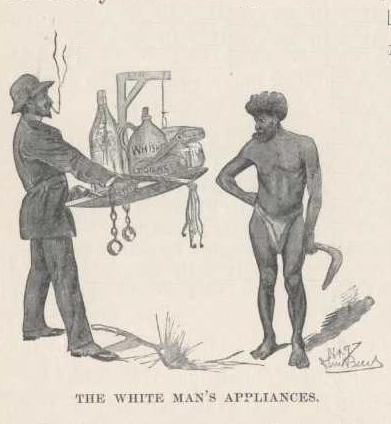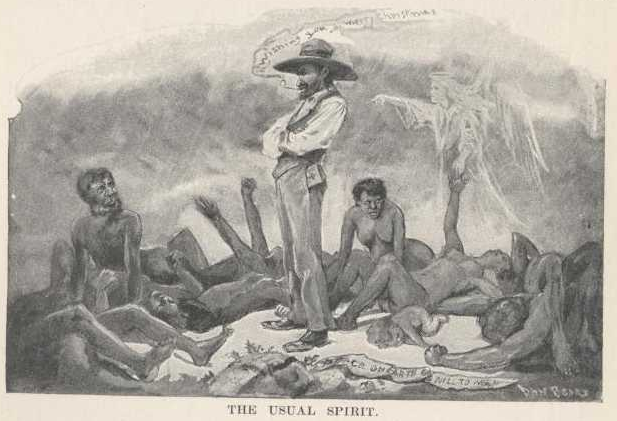They were lazy—always lazy. Perhaps that was their trouble. It is a killing defect. Surely they could have invented and built a competent house, but they didn't. And they could have invented and developed the agricultural arts, but they didn't. They went naked and houseless, and lived on fish and grubs and worms and wild fruits, and were just plain savages, for all their smartness.
Methods of Control
With a country as big as the United States to live and multiply in, and with no epidemic diseases among them till the white man came with those and his other appliances of civilization, it is quite probable that there was never a day in his history when he could muster 100,000 of his race in all Australia. He diligently and deliberately kept population down by infanticide—largely; but mainly by certain other methods. He did not need to practise these artificialities any more after the white man came. The white man knew ways of keeping down population which were worth several of his. The white man knew ways of reducing a native population 80 percent. in 20 years. The native had never seen anything as fine as that before.
For example, there is the case of the country now called Victoria—a country eighty times as large as Rhode Island, as I have already said. By the best official guess there were 4,500 aboriginals in it when the whites came along in the middle of the 'Thirties. Of these, 1,000 lived in Gippsland, a patch of territory the size of fifteen or sixteen Rhode Islands: they did not diminish as fast as some of the other communities; indeed, at the end of forty years there were still 200 of them left. The Geelong tribe diminished more satisfactorily: from 173 persons it faded to 34 in twenty years; at the end of another twenty the tribe numbered one person altogether. The two Melbourne tribes could muster almost 300 when the white man came; they could muster but twenty, thirty-seven years later, in 1875. In that year there were still odds and ends of tribes scattered about the colony of Victoria, but I was told that natives of full blood are very scarce now. It is said that the aboriginals continue in some force in the huge territory called Queensland.
Forms of Justice
The early whites were not used to savages. They could not understand the primary law of savage life: that if a man do you a wrong, his whole tribe is responsible—each individual of it—and you may take your change out of any individual of it, without bothering to seek out the guilty one. When a white killed an aboriginal, the tribe applied the ancient law, and killed the first white they came across. To the whites this was a monstrous thing. Extermination seemed to be the proper medicine for such creatures as this. They did not kill all the blacks, but they promptly killed enough of them to make their own persons safe. From the dawn of civilization down to this day the white man has always used that very precaution. Mrs. Campbell Praed lived in Queensland, as a child, in the early days, and in her "Sketches of Australian life," we get informing pictures of the early struggles of the white and the black to reform each other.
An Alien Landscape
Speaking of pioneer days in the mighty wilderness of Queensland, Mrs. Praed says:
"At first the natives retreated before the whites; and, except that they every now and then speared a beast in one of the herds, gave little cause for uneasiness. But, as the number of squatters increased, each one taking up miles of country and bringing two or three men in his train, so that shepherds' huts and stockmen's camps lay far apart, and defenseless in the midst of hostile tribes, the Blacks' depredations became more frequent and murder was no unusual event.
"The loneliness of the Australian bush can hardly be painted in words. Here extends mile after mile of primeval forest where perhaps foot of white man has never trod—interminable vistas where the eucalyptus trees rear their lofty trunks and spread forth their lanky limbs, from which the red gum oozes and hangs in fantastic pendants like crimson stalactites; ravines along the sides of which the long-bladed grass grows rankly; level untimbered plains alternating with undulating tracts of pasture, here and there broken by a stony ridge, steep gully, or dried-up creek. All wild, vast and desolate; all the same monotonous gray coloring, except where the wattle, when in blossom, shows patches of feathery gold, or a belt of scrub lies green, glossy, and impenetrable as Indian jungle.
"The solitude seems intensified by the strange sounds of reptiles, birds, and insects, and by the absence of larger creatures; of which in the day-time, the only audible signs are the stampede of a herd of kangaroo, or the rustle of a wallabi, or a dingo stirring the grass as it creeps to its lair. But there are the whirring of locusts, the demoniac chuckle of the laughing jack-ass, the screeching of cockatoos and parrots, the hissing of the frilled lizard, and the buzzing of innumerable insects hidden under the dense undergrowth. And then at night, the melancholy wailing of the curlews, the dismal howling of dingoes, the discordant croaking of tree-frogs, might well shake the nerves of the solitary watcher."
That is the theater for the drama. When you comprehend one or two other details, you will perceive how well suited for trouble it was, and how loudly it invited it. The cattlemen's stations were scattered over that profound wilderness miles and miles apart—at each station half a dozen persons. There was a plenty of cattle, the black natives were always ill-nourished and hungry. The land belonged to them. The whites had not bought it, and couldn't buy it; for the tribes had no chiefs, nobody in authority, nobody competent to sell and convey; and the tribes themselves had no comprehension of the idea of transferable ownership of land. The ousted owners were despised by the white interlopers, and this opinion was not hidden under a bushel. More promising materials for a tragedy could not have been collated. Let Mrs. Praed speak:
"At Nie Nie station, one dark night, the unsuspecting hut-keeper, having, as he believed, secured himself against assault, was lying wrapped in his blankets sleeping profoundly. The Blacks crept stealthily down the chimney and battered in his skull while he slept."
And So It Begins
One could guess the whole drama from that little text. The curtain was up. It would not fall until the mastership of one party or the other was determined—and permanently:
"There was treachery on both sides. The Blacks killed the Whites when they found them defenseless, and the Whites slew the Blacks in a wholesale and promiscuous fashion which offended against my childish sense of justice.
"They were regarded as little above the level of brutes, and in some cases were destroyed like vermin.
A Poisoned Pudding
"Here is an instance. A squatter, whose station was surrounded by Blacks, whom he suspected to be hostile and from whom he feared an attack, parleyed with them from his house-door. He told them it was Christmas-time—a time at which all men, black or white, feasted; that there were flour, sugar-plums, good things in plenty in the store, and that he would make for them such a pudding as they had never dreamed of—a great pudding of which all might eat and be filled. The Blacks listened and were lost. The pudding was made and distributed. Next morning there was howling in the camp, for it had been sweetened with sugar and arsenic!"

This paragraph is from a London journal:
"To learn what France is doing to spread the blessings of civilization in her distant dependencies we may turn with advantage to New Caledonia. With a view to attracting free settlers to that penal colony, M. Feillet, the Governor, forcibly expropriated the Kanaka cultivators from the best of their plantations, with a derisory compensation, in spite of the protests of the Council General of the island. Such immigrants as could be induced to cross the seas thus found themselves in possession of thousands of coffee, cocoa, banana, and bread-fruit trees, the raising of which had cost the wretched natives years of toil whilst the latter had a few five-franc pieces to spend in the liquor stores of Noumea."
You observe the combination? It is robbery, humiliation, and slow, slow murder, through poverty and the white man's whisky. The savage's gentle friend, the savage's noble friend, the only magnanimous and unselfish friend the savage has ever had, was not there with the merciful swift release of his poisoned pudding.
There are many humorous things in the world; among them the white man's notion that he is less savage than the other savages.